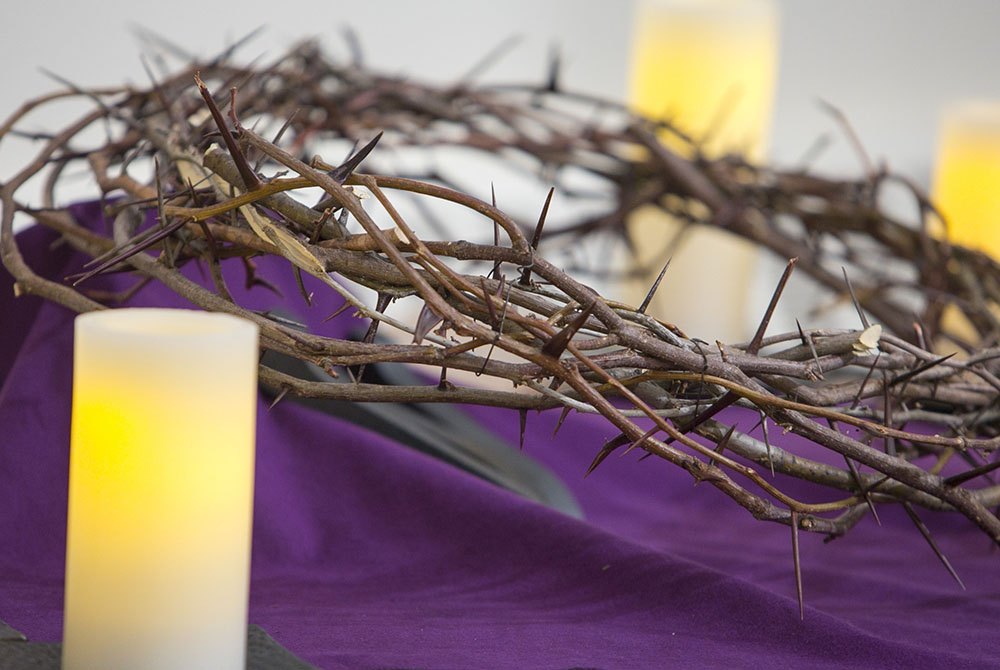
A crown of thorns is seen at St. Bonaventure Church in Paterson, New Jersey. (CNS/Octavio Duran)
Robert Burns, an 18th century Scottish poet, once penned an apology to the mouse whose house he destroyed while plowing. With obvious sympathy for the little creature, he wrote:
I doubt not, sometimes, that you may steal;
… Poor beast, you must live!
An odd ear in twenty-four sheaves
is a small request;
I will get a blessing with what is left
… cozy here, beneath the blast,
you thought to dwell,
till crash! The cruel plough passed
… But Mouse, you are not alone,
in proving foresight may be vain:
The best laid schemes of mice and men
go often askew,
And leave us nothing but grief and pain,
for promised joy!
Burns' delightful poetry depicts the compassion and solidarity the godly great can show the vulnerable defenseless. It also reflects the theme of Laetare Sunday when the mood of Lent is interrupted with invitations to rejoice, be joyful, exult, and be content.
The invitations to rejoice in the middle of Lent sing in a different key from the jubilant songs of Christmas or Easter. Our first reading, which seems to have inspired our Fourth Eucharistic Prayer, outlines the history of the people of God as a saga of infidelity, rejection of prophets, and of losing our way by seeking our own advantage. But we remember this history only because God continually refused to let it define our future. The real story underneath our first reading is that there has been nothing we could do to lose ourselves permanently or to spurn God definitively; God responds to every rejection with a counteroffer of love.
This leads directly to the Gospel which quotes Jesus' conversation with Nicodemus. Nicodemus had come to Jesus at night — meaning in secret and in ignorance. In the course of their exchange, Jesus invited Nicodemus to be born again, a concept Nicodemus interpreted too literally. In what followed, Jesus spoke the first passion-resurrection prediction in the Gospel of John; he announced that he would be lifted up and that everyone who contemplated and believed in him could have eternal life. Of course, Nicodemus did not understand this any more than the disciples understood Jesus' more direct teachings about his coming death, as recounted in the Gospels of Matthew, Mark and Luke.
Although the mystery of the cross might have been impossible to comprehend, Jesus' next statement explained the context for understanding him and his mission. He said that God so loved the world that the only Son was sent so that everyone who believes in him might have eternal life. That's a one-line summary of Jesus' mission — a summary reiterated twice in the coming verses and an explanation of everything else Jesus ever taught and did. Paul refers to this mystery as God's "kindness to us in Christ Jesus," God's offer of "the immeasurable riches of grace" for those who have faith. Paul insists that this brings a joy that does not originate in or depend on us. It is the gift of God. This is our reason for rejoicing on Laetare Sunday.
Advertisement
We may have started Lent with hopes, as St. Teresa of Kolkata might say, to "do something beautiful for God." But this Sunday tells us that anything we try to do is but a sideline. Everything of genuine value begins with God's great love — the love that created us in the divine image, the love that inspired prophets, the love that became incarnate in Jesus and that we can encounter in community. Today's readings invite us to refocus our Lenten practice, to abandon attempts to improve ourselves or try to be more acceptable to God.
Today's Gospel proclaims that we are acceptable because we are loved. When we comprehend that, even a little, we receive the power to respond with the kind of freedom that leads us to be what Paul calls "God's handiwork, created for the good works" that flow, not from our own efforts, but from a gratitude that engenders a share of God's own generosity in us.
We can live our lives like the mouse whose house Robert Burns unwittingly destroyed. We can try to make our plans reliable, build our cozy castles of mud or reputable accomplishments, or even of our own attempts at holiness. But nothing we build that way can be stronger than we ourselves are.
Laetare Sunday invites us to take time out to bask in God's great love, to sing songs of joy in a minor key that blend with harmonies of humility and gratitude. The God who neither needs nor wants our sacrifices became flesh simply and solely to draw us into all-encompassing love. Rejoice (and relax)! God refuses to allow that divine plan to go awry!
[St. Joseph Sr. Mary M. McGlone serves on the congregational leadership team of the Sisters of St. Joseph of Carondelet.]
